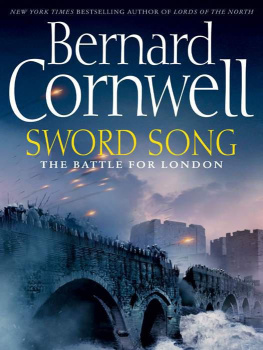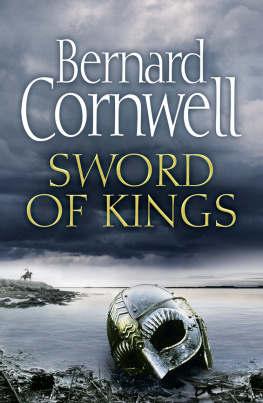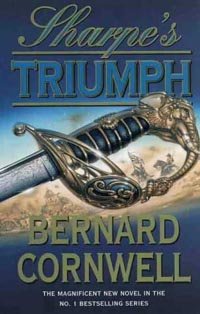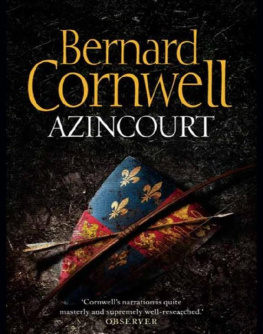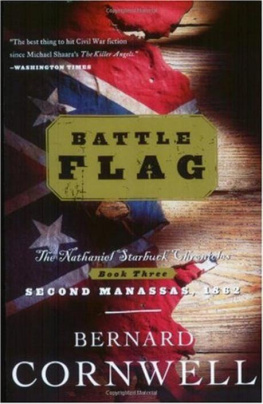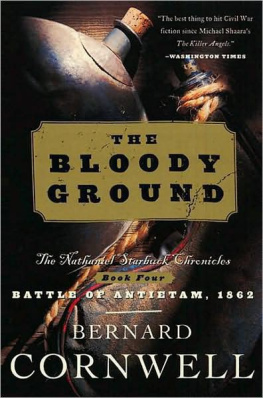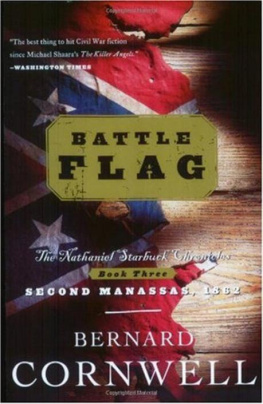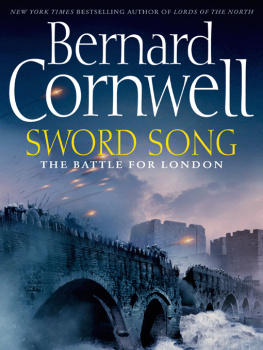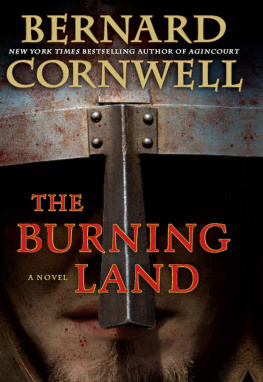Bernard Cornwell - Saxon Chronicles 4 Sword Song: The Battle for London
Here you can read online Bernard Cornwell - Saxon Chronicles 4 Sword Song: The Battle for London full text of the book (entire story) in english for free. Download pdf and epub, get meaning, cover and reviews about this ebook. year: 2009, publisher: HarperCollins, genre: Adventure. Description of the work, (preface) as well as reviews are available. Best literature library LitArk.com created for fans of good reading and offers a wide selection of genres:
Romance novel
Science fiction
Adventure
Detective
Science
History
Home and family
Prose
Art
Politics
Computer
Non-fiction
Religion
Business
Children
Humor
Choose a favorite category and find really read worthwhile books. Enjoy immersion in the world of imagination, feel the emotions of the characters or learn something new for yourself, make an fascinating discovery.
- Book:Saxon Chronicles 4 Sword Song: The Battle for London
- Author:
- Publisher:HarperCollins
- Genre:
- Year:2009
- Rating:4 / 5
- Favourites:Add to favourites
- Your mark:
- 80
- 1
- 2
- 3
- 4
- 5
Saxon Chronicles 4 Sword Song: The Battle for London: summary, description and annotation
We offer to read an annotation, description, summary or preface (depends on what the author of the book "Saxon Chronicles 4 Sword Song: The Battle for London" wrote himself). If you haven't found the necessary information about the book — write in the comments, we will try to find it.
Bernard Cornwell: author's other books
Who wrote Saxon Chronicles 4 Sword Song: The Battle for London? Find out the surname, the name of the author of the book and a list of all author's works by series.
Saxon Chronicles 4 Sword Song: The Battle for London — read online for free the complete book (whole text) full work
Below is the text of the book, divided by pages. System saving the place of the last page read, allows you to conveniently read the book "Saxon Chronicles 4 Sword Song: The Battle for London" online for free, without having to search again every time where you left off. Put a bookmark, and you can go to the page where you finished reading at any time.
Font size:
Interval:
Bookmark:
Part One
The Bride
Part Two
The City
Part Three
The Scouring

Australia
HarperCollins Publishers (Australia) Pty. Ltd.
25 Ryde Road (PO Box 321)
Pymble, NSW 2073, Australia
http://www.harpercollinsebooks.com.au
Canada
HarperCollins Publishers Ltd.
55 Avenue Road, Suite 2900
Toronto, ON, M5R, 3L2, Canada
http://www.harpercollinsebooks.ca
New Zealand
HarperCollinsPublishers (New Zealand) Limited
P.O. Box 1
Auckland, New Zealand
http://www.harpercollinsebooks.co.nz
United Kingdom
HarperCollins Publishers Ltd.
77-85 Fulham Palace Road
London, W6 8JB, UK
http://www.uk.harpercollinsebooks.com
United States
HarperCollins Publishers Inc.
10 East 53rd Street
New York, NY 10022
http://www.harpercollinsebooks.com
T here is more fiction in Sword Song than in the previous novels about Uhtred of Bebbanburg. If thelflaed ever was captured by the Vikings then the chroniclers were curiously silent about the incident, so that strand of the story is my invention. What is true is that Alfreds eldest daughter did marry thelred of Mercia, and there is a good deal of evidence that the marriage was not made in heaven. I suspect I have been extremely unfair to the real thelred, but fairness is not the historical novelists first duty.
The records of Alfreds reign are comparatively rich, partly because the king was a scholar and wanted such records kept, but even so there are mysteries. We know that his forces captured London, but there is controversy over the exact year in which that city was essentially incorporated into Wessex. Legally it remained in Mercia, but Alfred was an ambitious man, and he was evidently determined to keep kingless Mercia subservient to Wessex. With the capture of Lundene he has begun the inexorable northward expansion that will eventually, after Alfreds death, transmute the Saxon kingdom of Wessex into the land we know as England.
Much of the rest of the story is based on truth. There was a determined Viking attack on Rochester (Hrofeceastre) in Kent that ended in utter failure. That failure vindicated Alfreds defensive policy of ringing Wessex with burhs that were fortified towns, permanently garrisoned by the fyrd. A Viking chieftain could still invade Wessex, but few Viking armies traveled with siege equipment, and any such invasion thus risked leaving a strong enemy in its rear. The burh system was immaculately organized, a reflection, I suspect, of Alfreds own obsession with order, and we are fortunate to possess a sixteenth-century copy of an eleventh-century copy of the original document describing the burhs organization. The Burghal Hildage, as the document is known, prescribes how many men would be needed in each burh, and how those men were to be raised, and it reflects an extraordinary defensive effort. Ancient ruined towns were revived and ramparts rebuilt. Alfred even planned some of those towns and, to this day, if you walk the streets of Wareham in Dorset or Wallingford in Oxford you are following the streets his surveyors laid out and passing property lines that have endured for twelve centuries.
If Alfreds defensive scheme was a brilliant success, then his first efforts at offensive warfare were less remarkable. I have no evidence that thelred of Mercia led the fleet that attacked the Danes in the River Stour, indeed I doubt that foray was any of thelreds business, but other than that the tale is essentially true and the expedition, after its initial success, was overwhelmed by the Vikings. Nor do I have a shred of evidence that thelred ever subjected his young wife to the ordeal of bitter water, but anyone fascinated by such ancient and malicious sorcery can find Gods instructions for the ceremony in the Old Testament (Numbers 5).
Alfred the Great, as Sword Song ends, still has some years to reign, thelflaed of Mercia has glory to find, and Uhtred of Bebbanburg, a fictional character, though based on a real man who happens to be one of my paternal ancestors, has a long road to travel. England, in the late ninth century, is still a dream in the minds of a few visionaries. Yet dreams, as the more fortunate of my characters discover, can come true, and so Uhtred and his story will continue.
T he church of Saint Alban was ancient. The lower walls were of stone, which meant the Romans had built it, though at some time the roof had fallen in and the upper masonry had crumbled, so that now almost everything above head height was made of timber, wattle, and thatch. The church lay on the main street of Lundene, which ran north and south from what was now called the Bishops Gate down to the broken bridge. Beocca once told me that the church had been a royal chapel for the Mercian kings, and perhaps he was right. And Alban was a soldier! Beocca had added. He always got enthusiastic when he talked about the saints whose stories he knew and loved. So you should like him!
I should like him simply because he was a soldier? I had asked skeptically.
Because he was a brave soldier! Beocca told me, and, he paused, snuffling excitedly because he had important information to impart, and when he was martyred the eyes of his executioner fell out! He beamed at me with his own one good eye. They fell out, Uhtred! Just popped out of his head! That was Gods punishment, you see? You kill a holy man and God pulls out your eyes!
So Brother Jnberht wasnt holy? I had suggested. Jnberht was a monk I had killed in a church, much to the horror of Father Beocca and a crowd of other watching churchmen. Ive still got my eyes, father, I pointed out.
You deserve to be blinded! Beocca had said, but God is merciful. Strangely merciful at times, I must say.
I had thought about Alban for a while. Why, I had then asked, if your god can pull out a mans eyes, didnt he just save Albans life?
Because God chose not to, of course! Beocca had answered sniffily, which is just the kind of answer you always get when you ask a Christian priest to explain another inexplicable act of their god.
Alban was a Roman soldier? I had asked, choosing not to query his gods capriciously cruel nature.
He was a Briton, Beocca told me, a very brave and very holy Briton.
Does that mean he was Welsh?
Of course it does!
Maybe thats why your god let him die, I said, and Beocca had made the sign of the cross and rolled his good eye to heaven.
So, though Alban was a Welshman, and we Saxons have no love for the Welsh, there was a church named for him in Lundene, and that church appeared as dead as the dead saints corpse when Gisela, Finan, and I arrived. The street was night black. Some small firelight escaped past the window shutters of a few houses, and a tavern was loud with singing in a nearby street, but the church was black and silent. I dont like it, Gisela whispered, and I knew she had touched the amulet around her neck. Before we left the house she had cast her runesticks, hoping to see some pattern to this night, but the random fall of the sticks had mystified her.
Something moved in a nearby alleyway. It might have been nothing more than a rat, but both Finan and I turned, swords hissing out of our scabbards, and the noise in the alleyway immediately stopped. I let Serpent-Breath slide back into her fleece-lined scabbard.
The three of us were wearing dark cloaks with hoods so, if anyone was watching, they must have thought we were priests or monks as we stood outside Saint Albans dark and silent door. No light showed past that doors edges. I tried to open it, pulling on the short rope that lifted the latch inside, but the door was apparently barred. I pushed hard, rattling the locked door, then beat on its timbers with a fist, but there was no response. Then Finan touched my arm and I heard the footsteps. Over the street, I whispered, and we crossed to the alleyway where we had heard the noise. The small, tight passage stank of sewage.
Font size:
Interval:
Bookmark:
Similar books «Saxon Chronicles 4 Sword Song: The Battle for London»
Look at similar books to Saxon Chronicles 4 Sword Song: The Battle for London. We have selected literature similar in name and meaning in the hope of providing readers with more options to find new, interesting, not yet read works.
Discussion, reviews of the book Saxon Chronicles 4 Sword Song: The Battle for London and just readers' own opinions. Leave your comments, write what you think about the work, its meaning or the main characters. Specify what exactly you liked and what you didn't like, and why you think so.

